Save 10% today on your lessons using the code GIVEME10


Creating an Engaging Summer English Project

A summer English project is required in some schools. These can become very onerous on the students and teachers. Today’s blog post is written by Rebecca Gettelman who is a middle and high school teacher from the Midwest. She has been teaching for over eleven years.
A number of years ago I started teaching at a new school. My job offer came in the first part of June, and along with my contract, I was handed a stack of books and an assignment sheet and was told that all of my students would arrive on day one with a completed summer reading project to hand in. I was quite surprised as I had never had summer work until AP courses in high school, but not in middle school. I was allowed to design the project as I saw fit, but a summer reading project was a required part of the curriculum. After several years of rethinking, rewriting, and tweaking, I came up with a project that is pretty effective.
Let’s think about how to design and create a project that fits the needs of your students and curriculum.
What Do You Want Your Students To Do?
Do you want your students to read a least one book over the summer? Do you want them to do more than just read—something along the lines of analyzing, reviewing, and thoughtfully considering messages? Would you rather your students focus on writing? Do you want them to write a little bit every day or to just write one big paper?
By starting with this you make sure that you don’t just end up with the same stale summer book report that has been assigned for decades and instead come up with a project that truly fits your class’s needs and flows smoothly into the new school year.
Include Elements of Fun and Creativity
Remember, it is summer vacation. Keep in mind how much you, the teacher, are ready for a break by the time you hit those final days of school and remember that your students (and their parents) need some of that downtime too. That doesn’t mean you shouldn’t assign a summer project, it just means that something that has elements of fun and inspires a student’s creative side is so much more enjoyable than something that doesn’t. If you are going to assign homework over the summer, you will get much better results if it isn’t something your students detest from start to finish.

Choice Is Important
I love to read. But hand me a book (even one that I love) and tell me I have to read thirty pages and suddenly it becomes work that I will put off for days on end. Remember this when you are putting together your summer project— choice makes all the difference .
Now, the students can’t have the choice to just not do the project, but you can offer them other choices.
- Offer three vastly different books and they have to read one.
- Offer a four-part assignment and only two need to be completed.
- Offer a summer writing assignment, but they get one week off each month of summer.
- Give students the end goal and let them design their project. Read more on student-designed assessments here .
A Few More Suggestions
- A major downfall when assigning summer work to students is that you start day one of the new school year with a huge pile of grading to do. Why not consider offering optional due dates over the summer. You could even offer extra credit to students who turn in work early.
- Make the project something that students can’t just download. There are a million book reports available on the internet for anyone who wants to download them. By creating a project that is unique, you avoid the curse of plagiarism.
- If you are assigning summer reading, give your local library a heads-up on book titles that you will be using. The librarians will appreciate it. This allows them to make sure they have at least a couple of each title on hand.
Summer projects are a long-standing tradition in many schools and districts, but that doesn’t mean that the assignment has to be old or boring. By designing a great summer project, you can help yourself and your students get something positive and even enjoyable out of this tradition.
Check out these ready to use summer project ideas:
- Summer Reading Project
- 12 Genre Book Report (let students select their genre-based assignment)
- Summer Writing Project
- Novel Study Choice Board
- Creative Writing Prompts and Activities
- Book Versus Movie Analysis Project
Related Posts

This FREE persuasive writing unit is
- Perfect for engaging students in public speaking and persuasive writing
- Time and energy saving
- Ideal for in-person or online learning
By using highly-engaging rants, your students won’t even realize you’ve channeled their daily rants and complaints into high-quality, writing!


ChatGPT for Teachers
Trauma-informed practices in schools, teacher well-being, cultivating diversity, equity, & inclusion, integrating technology in the classroom, social-emotional development, covid-19 resources, invest in resilience: summer toolkit, civics & resilience, all toolkits, degree programs, trauma-informed professional development, teacher licensure & certification, how to become - career information, classroom management, instructional design, lifestyle & self-care, online higher ed teaching, current events, writing into summer: creative assignments can keep students academically engaged.

Many students see the summer break as a time to put off their studies and stop thinking about school for three months. Yet parents and teachers alike know that summer also lets students backslide in their academic development.
Summer writing projects offer a chance to slow the slide — letting students dive into subjects they care about but might not get a chance to explore during the school year. The key is to avoid tedious academic assignments and focus on projects that are fun, engaging, and developmental.
Here are two ways to make that happen:
Vacation journals
Many students get a chance to travel in the summer. Whether the trip is foreign, domestic, or a staycation, travel helps students experience and understand different parts of their world which, in turn, provides opportunities for research and academic development.
Think about giving students a travel-writing assignment with journal entries made up of three parts: research, note-taking, and reflection.
Before going on their trip, parents and their kids should make a list of locations they aim to visit. This enables parents to help their children track down resources about their destination. Students can write down interesting aspects of the location or jot down historical facts.
Note-taking
While at the location, students should write down the most memorable things they notice. They can keep track of information they read, note new facts they learn, or sketch the things they see. The idea is to get students actively engaged in the discovery process.
After visiting each location, students should reflect upon what they’ve seen. They should think about how it related to what they read beforehand, how the place looked different than what they imagined, or anything significant they noticed while there.
One benefit of this writing assignment: Students who keep their journals over the years may find they enjoy reading about and remembering their early travel experiences.
What about students who can’t travel during the summer? They can do the same assignment for trips to the zoo, local museums, or even hikes in the mountains.
Creative writing
Many students join summer reading challenges or use their vacation to read a new series of books. One way to encourage creative thinking in students is to have them write about characters from the books they are reading — essentially creating amateur fan fiction. Parents can make a list of cards about scenarios students might write about and let them select new cards as they progress through the book.
For instance, the cards might challenge the student to write an alternative ending, to rewrite a hero as a villain, to tell a scene from a different character’s perspective, and so on.
This process helps students develop important storytelling and creative-thinking skills. And because it pairs well with reading, students will develop their reading and writing skills simultaneously.
Fun writing tasks will pay off
While summer should be a time for fun and adventure, it doesn’t have to be devoid of academic progress. Students will have plenty of time on their hands; parents should use it to help them see how writing can be a key part of fun assignments.
Assigning enjoyable activities might also help children get more invested in the family’s travel plans. While they’re strengthening their academic skills, they might also uncover creative writing skills they never knew they had.
Caitrin Blake has a BA in English and Sociology from the University of Vermont and a master’s degree in English literature from the University of Colorado Denver. She teaches composition at Arapahoe Community College.
You may also like to read
- 4 Ways to Keep Students Engaged When Summer Break Is So Close
- Nerd Culture and Storytelling: How Tabletop Games Can Inspire Creative Writing Students
- A Summer that Counts: How Parents Can Keep Students' Math Skills Fresh
- How Teachers Can Increase the Impact of Essay Writing for Students
- 5 Ways to Exercise Essay Writing for Elementary Students
- How the Summer Learning Gap Affects Students
Categorized as: Tips for Teachers and Classroom Resources
Tagged as: Engaging Activities , Language Arts , New Teacher , Professional Development
- Online & Campus Master's in Secondary Educati...
- Back to School Resources for Online & In-clas...
- Online & Campus Master's in Special Education
Just added to your cart
Tips for Creating Summer Reading Assessment Ideas (Plus 3 Fun Ideas!)
Many teachers assign summer reading. However, summer reading can be difficult for students who lack time management skills, motivation, or even the literacy skills necessary to complete the work.
For this reason, summer reading assessment can also be challenging, as students can disengage from the material and Google answers to questions or read summaries instead of reading the book.
Despite its challenges, summer reading assignments can still have value in the English Language Arts classroom. We need to look at how we assess summer reading -- making reading enjoyable rather than a drag for everyone.
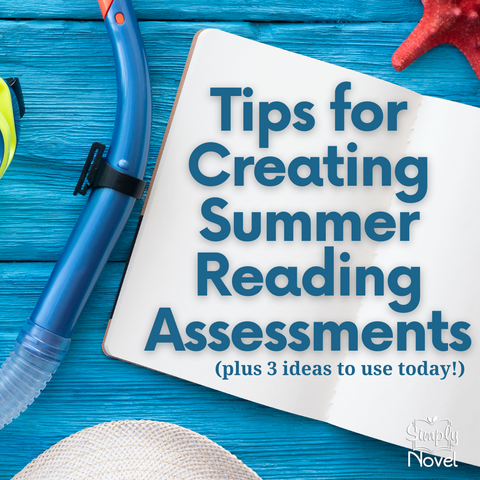
Here's how to get the most out of your summer reading assignments:
What is a summer reading assessment?
I like to look at assessments as three prongs of the same concept: Accountability Assessments, Critical Thinking Assessments, and Creative Assessments. Each one is slightly different from the other, but all equally valuable assessment tools. The three prongs overlap more often than not.
Each one has value, and they work better when you vary the types of assessments you use, and you do not rely on just one type too much. Each type of assessment requires students to think on different levels of Bloom’s Taxonomy.
What are the three types of Reading Assessments?
Accountability Assessments
These are traditional tests and assignments that aim to keep students accountable to complete the reading. Think: study guides, reading guides, and end-of-the-novel tests and quizzes. These are not to be confused with state or district-level standardized testing.
Critical Thinking Assessments
These are higher-level critical thinking assignments that encourage students to analyze, synthesize, and evaluate the summer reading. There are a variety of ways to format this type of assessment. Think: small group discussions such as a Socratic Seminar, or a literary analysis paragraph writing where students identify and analyze the purpose and effectiveness of an author’s use of figurative language and other literary elements.
Creative Assessments
These are projects and other assignments that require accountability and critical thinking, but also include creativity and fun. Think of posters, interpretive projects, video creation, podcast creation, etc.
Creative Reading Assessments
Creative Assessments are by far the most engaging and valuable to address the unique challenges of summer reading. Innovative summer reading assessments can make all the difference for kids who may not have otherwise completed the task. Having relevant, engaging, and interesting assessments will not only increase the chances that students will do the summer reading, but it will also be a great introduction to your class in the fall!
Below are some ideas for creative reading assessments for your summer reading assignments.
Snap Chat Conversation
Snapchat has been around for a while, and the way teens use it, it doesn’t seem to be going away anytime soon. Why not capitalize on that? (Kids can still keep their streaks going, too!) For this project, have students create a series of snaps that show characters interacting with each other. They can save these snaps as images, upload them to Google Slides or PowerPoint and either just turn them in, or present them. Better yet, have that student select a partner to read out loud the snaps!
Character Awards
To freshen up your summer reading assignment, try having students create unique and interesting awards for the characters. This is a good way for students to recall information and analyze character development at the same time. Ask students to come up with the award and the reason why that character earned it. For example, Boo Radley could receive the award for “Hero Least Likely to Need Sunscreen” for his valiant rescue of the Finch children after years of reclusive behavior that goes back to his childhood. To make it more fun and engaging, another student could come up to receive the award, in character, and give an acceptance speech with references from the text.
Character Letters of Recommendation
Students, especially juniors and seniors, are familiar with the art of asking and receiving a letter of recommendation. But they haven’t had the experience of writing one! With this type of assessment, students can get into the counselor/teacher character and write a letter praising, thinly sugarcoating, or even criticizing a character from the reading. Clear references to the text should be used to support your reasoning for recommending, or even not recommending, a character.
These are just three different ideas to assess your summer reading assignments for middle or high school in a creative way. What creative ways do you use to assess summer reading? We'd love to hear!
- Share Share on Facebook
- Tweet Tweet on Twitter
- Pin it Pin on Pinterest
Leave a comment
Please note, comments must be approved before they are published
- choosing a selection results in a full page refresh
- press the space key then arrow keys to make a selection

Summer Reading
NEST+m is a community of readers. Each summer, our students receive grade-specific reading assignments. Please see the information below for Lower, Middle and Upper Grades summer reading assignments. All books have been carefully chosen by our ELA teachers.
Before starting your assignment, please read the important information below:
“Books are sometimes windows , offering views of worlds that may be real or imagined, familiar or strange. Readers have only to [look] through in imagination to become part of whatever world has been created and recreated by the author .
[A book] can also be a mirror. Literature transforms human experience and reflects it back to us, and in that reflection we can see our own lives and experiences as part of the larger human experience .
Reading, then, becomes a means of self-affirmation , and readers often seek their mirrors in books…
[We] need books that will help them understand the multicultural nature of the world they live in, and their place as a member of just one group, as well as their connections to all other humans.”
“ Mirrors, Windows, and Sliding Glass Doors ” (1990)

Upper Grades 9-12
Summer 2024 Assignment is still to be announced!
Last year's assignment:
Please see the Grades 9-12 Summer Reading Assignment
- Grade 9 reading list
- Grade 10 reading list
- Grades 11 & 12 reading list

Middle Grades 6-8
Please see the Summer Reading assignments for 2023 :
- 7th & 8th Grade
Summer reading assignments are due during the first week of ELA class.

Lower Grades K-5
Please see our Summer 2023 Reading Assignments :
- Kindergarten does not have a Summer Reading assignment
- Grades 1 & 2
- Grades 3, 4 & 5
Get real time school updates on your mobile device with eChalk Notify .
Connect with code 8UTD2R to get instant alerts or log in with your eChalk user account for the latest updates from all your classes and groups.


- Share on Facebook
- Tweet This Resource
- Pin This Resource

Summer Reading and Writing Assignment: Fahrenheit 451
Twelfth graders explore Fahrenheit 451 by Ray Bradbury. In this reading and writing lesson, 12th graders read the book and think of five books to save from the fire. Students write an essay explaining why they'd save them. The essay becomes the basis for a discussion about various themes in the novel, including censorship and conformity vs. individuality.
Start Your Free Trial
Save time and discover engaging curriculum for your classroom. Reviewed and rated by trusted, credentialed teachers.
- Collection Types
- Activities & Projects
- Assessments
- Graphics & Images
- Handouts & References
- Interactives
- Lab Resources
- Learning Games
- Lesson Plans
- Presentations
- Primary Sources
- Printables & Templates
- Professional Documents
- Study Guides
- Instructional Videos
- Performance Tasks
- Graphic Organizers
- Writing Prompts
- Constructed Response Items
- AP Test Preps
- Lesson Planet Articles
- Online Courses
- Interactive Whiteboards
- Home Letters
- Unknown Types
- Stock Footages
- All Resource Types
See similar resources:
Creative writing workshop, close reading passages of literature, fahrenheit 451 anticipation guide, book creator, reading to write, the word on college reading and writing, ban that book, writing that works, get everybody reading this summer, active reading with american history.

- Career Center
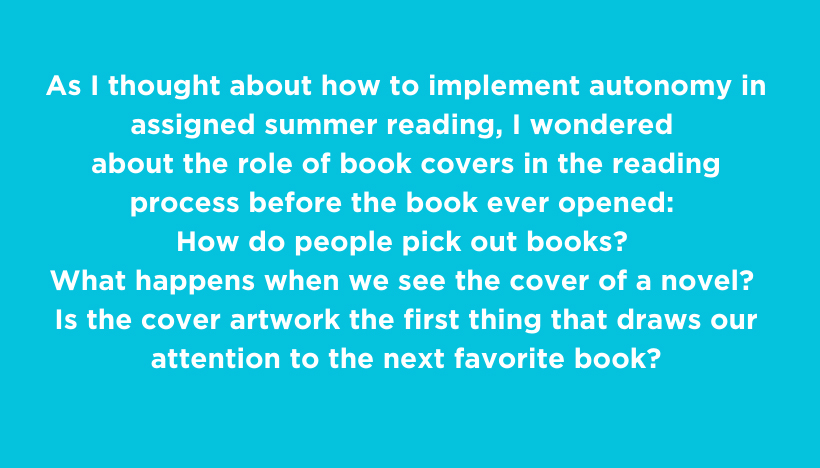
Rethinking Summer Reading Cover to Cover
NCTE 06.11.20 Instruction
This post was written by NCTE member Shelby Boehm.
These are unusual times for teachers and students.
With the summer months looming, weeks usually spent reflecting on a year of learning look different, as classrooms are mostly empty due to the COVID-19 global pandemic. Now as the newness of virtual learning becomes routine, anxiety about missed learning opportunities is growing in anticipation of a new school year.
Required summer reading is a common literacy practice in many English courses. These reading assignments are usually made at the end of one school year with a deadline during the first week of the upcoming school year. The teaching practice of summer reading has often been utilized to offset “the summer slide” (i.e., the loss of literacy development over summer months).
While the health and overall well being of future students is a top priority, you may also be thinking about how to support literacy learning over the summer in preparation for a new school year. Below, I suggest one approach to assigned summer reading that worked well in my high school English classroom.
A Picture is Worth . . . How Many Words?
During my teacher preparation program, my writing methods professor, Dr. Jane Townsend, brought a stack of postcards from various art museums to class one afternoon. She asked us each to pick a postcard. After time to consider our options, we used our chosen postcard during a free-writing activity. We then talked about the power of visual literacy, and how images might inform our future classroom instruction.
Later, as a high school teacher, I used visuals often in my lessons. After a less-than-successful iteration of assigned summer reading during my first year of teaching, I started to rethink my approach. Since my previous summer reading assignment involved assigning one text for all students to read, I knew I wanted to give students some freedom to choose their book.
I also wanted to be more flexible and sensitive to the needs of students—hopefully the assignment would motivate students to obtain the books and read them, but their investigation and what they found out about their own reading preferences would have meaning even for students who didn’t want to or weren’t able to obtain the books.
Cover Reader: A Closer Look at Book Covers
The Cover Reader assignment was born out of my interest in using visuals in the classroom while also wanting to help students learn more about their own reader identities and preferences.
As I thought about how to implement autonomy in assigned summer reading, I wondered about the role of book covers in the reading process before the book ever opened:
- How do people pick out books?
- What happens when we see the cover of a novel?
- Is the cover artwork the first thing that draws our attention to the next favorite book?
As I thought about these questions, I began to realize that if I knew what books my students were drawn to, I might also learn more about who they are as readers and people outside of my classroom. Just like the art museum postcard activity, articulating what book cover imagery stood out and why seemed like a powerful process for developing literacy skills.
In the Cover Reader assignment ( See the first page of my handout) , students are asked to find five book covers for books that look interesting, and which they haven’t read, using sources available to them (Amazon, Goodreads, the library, bookstores, or even the bookshelves of friends or family) and write two or three sentences about each cover describing why it appeals to them.
While my version of the Cover Reader assignment did not require students to read the books they found interesting, students did indeed read them. Many students said that once they saw compelling texts, they felt motivated to read. Additionally, students who struggled to find texts that they gravitated towards were able to voice that challenge. While I did give occasional book suggestions, I also helped students navigate their search for interesting material.
I was most excited to realize that students, who often aren’t given choice in selecting their own reading in school, learned something about their preferences and where to find books they might enjoy. The ability to curate an engaging reading list is an invaluable skillset if we consider part of our work as English teachers to promote literacy development beyond our classroom.
Consider using the Cover Reader assignment with your own students, whether for summer reading or as a supplemental resource during the year. The activity can be easily adapted. I’ve used a similar activity to ask students to preview our classroom library. Additionally, the Cover Reader can be modified to include texts outside of print-based literacies, such as podcasts or TV series. By considering books from cover to cover, we might rethink summer reading in a way that motivates and encourages all students to build their to-be-read lists.

Shelby Boehm is a current doctoral student in English education at the University of Florida and a former high school teacher. She can be reached at [email protected] or on Twitter @TeamBoehm.
It is the policy of NCTE in all publications, including the Literacy & NCTE blog, to provide a forum for the open discussion of ideas concerning the content and the teaching of English and the language arts. Publicity accorded to any particular point of view does not imply endorsement by the Executive Committee, the Board of Directors, the staff, or the membership at large, except in announcements of policy, where such endorsement is clearly specified.
Much Ado About Teaching
Summer reading in ap lit..

A few years ago I revamped my summer reading assignment.
It marked an important departure for me. It was a significant step in my growth as a teacher. I’ll explain why, but first I want to share what I have done in years past.
THE OLD SUMMER READING ASSIGNMENT
My summer assignment has gone through different iterations over the years, but the gist of it has always been that the students had to read two books — How to Read Literature Like a Professor: A Lively and Entertaining Guide to Reading Between the Lines and 1984 — and develop an outline for each. There are many versions of this assignment online. Its probably where I first developed the idea. I must have Googled “ How to Read Literature Like a Professor summer assignment.” A bunch of results came up, and seeing that a lot of other teachers paired Thomas C. Foster’s work with another novel probably validated its worth in my mind.
I liked that both books were accessible and my students could find help online if they needed it.
I liked that I was introducing my students to good literature without ruining their summer with dense texts and mountains of work.
I liked that when students returned from school I could assess them by asking them to apply a chapter from How to Read Literature Like a Professor to 1984 .
I liked that I was doing something to prevent the summer slide.
THE PROBLEM WITH THE OLD ASSIGNMENT
There was nothing pedagogically wrong with my old summer reading assignment. But there were certain things about it that had bothered me over the years:
- Students can easily find summaries of How to Read Literature Like a Professor online ( like this link) .
- Many of my students are not readers of classic literature on their own. In spite of its cheeky humor and tone, they did not have the awareness of texts mentioned in How to Read Literature to fully appreciate the references.
- Students felt that How to Read Literature Like a Professor simplified the process of reading, reducing everything to either a symbol or an allusion.
- The assignment was not thoroughly thought through. It was too simplistic. Basically I was asking students to read and outline. I felt like I was simply following what others were doing without making this assignment a true reflection of my teaching and my goals.
- There wasn’t much feedback I could provide on an outline and consequently little room for growth.
THE GOALS OF SUMMER ASSIGNMENTS
I believe that when students are faced with low-rigor tasks, they create low achievement even when students do well on these tasks. In addition, such tasks contribute to the boredom students so often complain about when they spend too many hours on work that is routine and bland, often centered on discrete skills.
Outlining a text is a low-rigor task. It requires little skill beside extrapolation and summarization.
I want my summer assignments to have what I believe are the three principles of an effective assignment:
1. Effective assignments provide clear expectations about what should be completed, how it should be completed, and why the assignment is important.
I needed to rethink the final part of that criteria. While the original assignment provided clear expectations and walked students through the steps to be completed, it never explained why the assignment was important. When there is no value attached to an assignment, the work can feel like busy work.
Assignment-making requires teachers to clarify what learning is demonstrated and how it can be demonstrated. I needed to answer questions about purpose and relevance: “Why are my students doing this? What greater good will result from this work? As well as, are there significant concepts connected to the curriculum?”
2. Effective assignments are formative, providing feedback that allows teachers to adjust their instruction and scaffold learning.
I also needed to understand how my teaching can be informed by what the students completed. This is where the outlines of the prior assignment failed to be valuable. I was learning nothing about my students nor anything about their thinking.
With the new summer assignment adjustments would I make based on the work that students produced? What was I learning about their reading skills or their writing skills?
Good assignments, whether in the summer or during the school year, should inform instruction, giving teachers a chance to assess skills and modify instruction accordingly.
3. Effective assignments set high expectations and provide pathways to achieve those expectations.
I want the new assignment to communicate high expectations for critical thinking and levels of analysis. I want my students to be challenged no matter what skill sets or content background they bring into the course.
WHAT MY STUDENTS ARE DOING INSTEAD
- I want my students to have a summer experience that is not punitive but is preparatory. I don’t want to punish them with mountains of work or use a summer assignment as a gatekeeper for the class. I want to set a foundation for the enjoyment that comes from reading, thinking, and writing creatively and analytically.
- I want my students to see that great ideas can be expressed in a variety of formats. Therefore, they will read blog articles, watch YouTube videos, and read poems as well as a novel.
- I want them to learn from readers, writers, and thinkers that I admire. I’m not just handing them books and asking them to read them, I want them to observe how others analyze and how others approach the act of writing. These pieces have the levels of analysis that will promote high expectations for my students.
- I want them to choose the novel they read, not have one assigned to them.
- I want them to have a space of their own creation (their StudyTee Notes) where they will respond to each text that they encounter in thoughtful and diverse ways.
THE SUMMER READING TEXTS
- StudyTee’s Note-Taking Method
- The NerdWriter Analyzes Edward Hopper’s “Nighthawks”
- Leo Babauta’s Why I Read (+ a Dozen Book Recommendations)
- Any novel on this list or this one
- Poetry Foundation’s Poem of the Day
Download the Summer Reading Assignments for Susan Barber and Brian Sztabnik
Concluding thoughts.
I know that I am asking my students to complete somewhat unorthodox summer assignments. They are not being handed a textbook or a stack of novels and asked to complete a series of study guide questions or outlines. There comes a point in a teacher’s career when he or she stops doing things just because everyone else is doing them and strikes out on his or her own path.
And this has been that moment for me.
Instead, I am giving them models of critical thinkers. I am exposing them to a variety of texts across a span of genres. I am giving them the power to choose the novel and poems that they want to read. And it will have clear expectations, an understanding of why each component of the assignment is important, a chance for me to gain formative feedback, and high expectations for success.
Brian Sztabnik is just a man trying to do good in and out of the classroom. He was a 2018 finalist for NY Teacher of the Year, a former College Board advisor for AP Lit, and an award-winning basketball coach.

End of Year Activities

It Was the Best of Times, It Was the Worst of Times
You may also like.

“The Barren Moors”

Question 2 Reflections: People of the Whale

LMS Voice Curriculum
Please go to the Instagram Feed settings page to create a feed.

Copyright © 2024 DAHZ All Rights Reserved. Much Ado About Teaching.

Summer Reading 2023
High five! You made it to summer! Tech's English Department hopes that July and August offer you some rest and relaxation, some time to invest in the people and activities you love. We also hope you find a book to enjoy. For this summer assignment, choose any work of fiction or non-fiction that interests and challenges you. You can see our suggestions on the next page, but the choice is up to you.
What do I do over the summer?
- Select a book that you haven't read before from our suggested list or find one on your own. You can check many of these books out digitally from our school library using the Sora app or from a public library. Be thoughtful about your selection. Choose something of personal interest and something that will push you as a reader and thinker. You are free to read from any grade level or even something that isn't on our list.
- Choose one of the options below:
- Option 1: Write a personal response to your chosen book. What did you find relatable / compelling / infuriating / thought-provoking / problematic and why? How do the issues and themes this book raises relate to your life? Dig into some specific ideas and moments that got you thinking. (350-500 words)
- Option 2: Create a piece of visual art that explores an important idea from the book you read. The piece should delve into your response to the book, not just provide an illustration. It may be any size or medium, but it must be your original artwork. Include a caption that explains your intentions and choices. (~150 words)
- Option 3: Compose a letter to the author of your chosen book OR a letter to a character in it. In your letter, bring up the ideas and questions that the book raised for you. Consider offering your personal reactions to specific moments in the book. Write like it's a conversation, not an essay. (350-500 words)
- Two additional guidelines to consider:
- The spirit of this assignment is to encourage curiosity and thoughtfulness about books and the world. Be original, be creative, have fun! Please, please, please don't be boring. We are interested in your opinions, reactions, and responses to the book. No summaries please; we can read those online too.
- Save your work digitally so that you can easily upload your writing/artwork to Google Classroom in the fall by Friday, September 15th .
Come to class in the fall ready to talk to your new classmates and teacher about your book and share your writing/artwork. Your English teacher will provide more details in the first week of school, but plan to submit your work on Google Classroom by Friday, September 15th . EVERY SINGLE TECH STUDENT IS EXPECTED TO COMPLETE A SUMMER READING ASSIGNMENT!
For Rising Seniors, Class of 2024: In addition to the summer reading, all seniors are expected to have a complete draft of an essay that responds to one of the Common Application essay prompts . You may revisit the work you did with your 11th grade English teacher this past spring or start over with a new idea based on what you learned. This essay is also due Friday, September 15th . You will spend some time in the early fall revising this piece.
Alternate Assignments: Please note that students who are taking the following classes next year have a different summer assignment that they should complete in lieu of this one: AP Capstone Seminar, AP Capstone Research, and AP English Literature . Those assignments are posted below. Also note that juniors taking AP English Language must choose from the list of 11th grade non-fiction options.
What's that you say? You want to read MORE!?
Please join us for the BTHS Summer Reading Challenge Bingo ! Read three books in different categories and win Tech merch! Students, staff, parents and alumni are all invited to participate.
- 10th Grade AP Capstone Seminar - Complete the alternate assignment below called "Summer Reading 2023 AP Capstone Seminar."
- 11th Grade AP English Language & Composition - You MUST choose from the list of suggested 11th grade NON-FICTION works in the general assignment.
- 12th Grade AP English Literature - Complete the alternate assignment below called "Summer Reading 2023 AP English Literature."
- 12th Grade AP Capstone Research - Complete the alternate assignment below called "Summer Log 2023 AP Capstone Research."
summer writing assignments
All Formats
Resource types, all resource types.
- Rating Count
- Price (Ascending)
- Price (Descending)
- Most Recent
Summer writing assignments
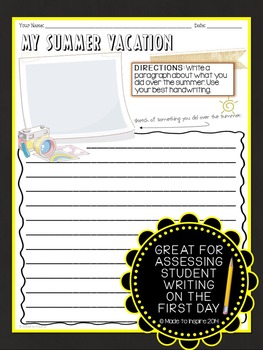
MY SUMMER VACATION First Day Writing Assignment

Summer Packet | 525 Assignments | Reading, Writing , Math, Art... (Gr. 3-7)

Summer Creative Writing Assignment

- Google Apps™
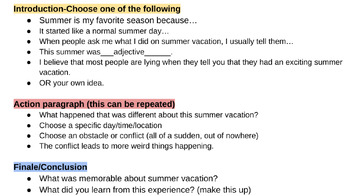

My Boring Summer (creative writing assignment )

- Google Docs™
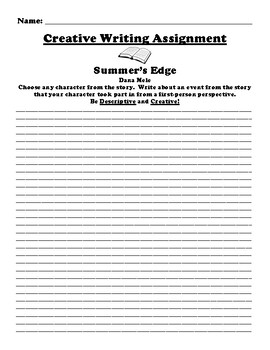
Summer ’s Edge CREATIVE WRITING ASSIGNMENT
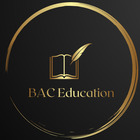
Summer Assignment No. 3 Stephen King's On Writing (*AP Language) and Ancillaries

- Internet Activities
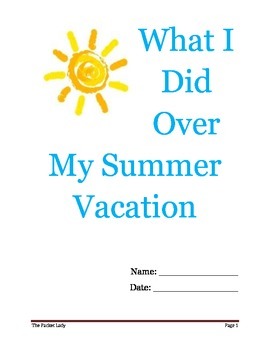
"What I Did Over the Summer " 5 Paragraph Essay - Scaffolded Writing Assignments

The Summer of Bitter and Sweet CREATIVE WRITING ASSIGNMENT
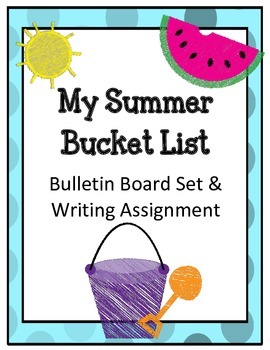
My Summer Bucket List! Bulletin Board Writing Assignment Prompt End of Year
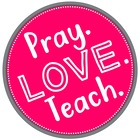
Summer Journal Writing | Authentic Writing Experience | Summer Assignments

Narrative Writing Assignment - Summer

Beginning-of-Year/ Summer Writing Assignment - Personal Narrative

Summer Journal | Summer Assignment | Summer Writing Topics
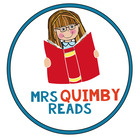
“ Summer of the Mariposas” CREATIVE WRITING ASSIGNMENT
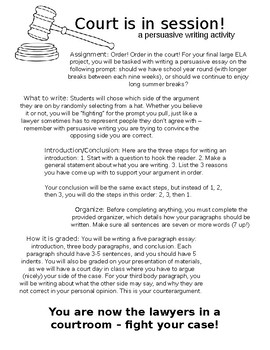
Persuasive Writing Courtroom Assignment ( Summer vs. School All Year)

What to see this summer ?! Bulletin Board Writing Assignment Prompt End of Year
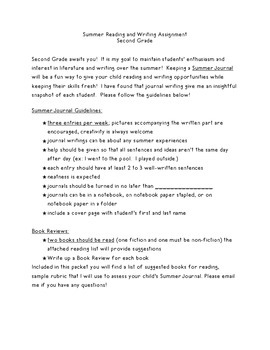
Summer Reading and Writing Assignment

Summer Vacation Sentence Stem - Writing Assignment

All Summer in a Day by Ray Bradbury - Short Story Unit Assignments & Activities
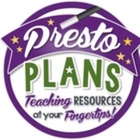
Summer School Reading and Math Bundle

- Google Drive™ folder
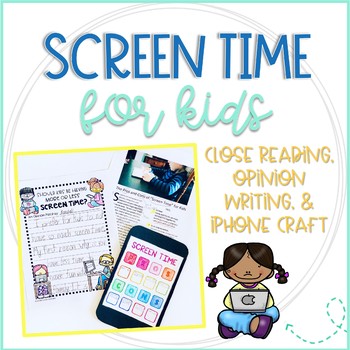
Screen Time: Close Reading Article, Opinion Writing Paper, & iPhone Craft
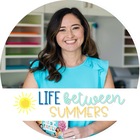
Summer School Literacy Set
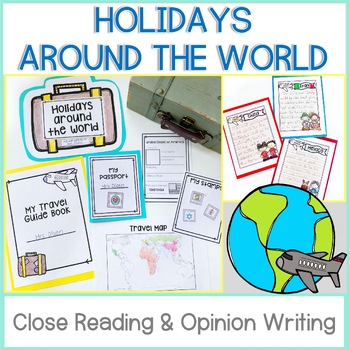
Holidays Around the World Suitcase & Passport: Close Reading & Opinion Writing
- We're hiring
- Help & FAQ
- Privacy policy
- Student privacy
- Terms of service
- Tell us what you think
How to Assess Your Students' Summer Reading Progress
- Nicole Borkoski
- Categories : Summer reading lists for grades k 12
- Tags : Summer learning

Assigning books for students to read over the summer can be tricky. How do you know they read the book? How do you know they didn’t ask a friend to summarize the book for them? Here are a couple of different ways of assessing their progress.
Reading Tests
Gather all of your English teachers together. As a group, decide your summer reading list. After you have your list, assign each teacher several books to read over the summer. Each English teacher is responsible for not only reading his/her books, but also for creating a multiple choice test (and answer key!) for each test. That way, once the kids come back to school, they take the test over which book they have read. Grading is a breeze for the teachers because both the test and answer key are already completed!
Going Beyond the Average Book Report
If you don’t want to give the standard test over the summer reading materials, consider giving a more project-based assignment. Each student has to create a book jacket for his/her book. On the front, they need to draw (by hand!) an alternative cover to their book. (For example, one of my students just did this book report on The Lovely Bones. She drew a bunch of bones (creepy!) in the shape of a heart.)
Next, the student needs to write an original summary of their book on the back of the book jacket. Then they need to find three quotes from the book that they really like and write them on the back. Inside of the book jacket, they need to summarize at least five different characters, all the while trying to hook the person looking at the book jacket. Finally, the student should give the book a review out of five stars telling why they would or would not recommend the book to a friend.
Alternate Assessment Ideas
Have students create a comic book that depicts their book. (Obviously, this works best if the book is funny!) Decide how many lines of dialogue and how many pictures in each frame, and leave the rest to them! Some kids can get really creative!
Another great idea is to have the kids create a movie out of the book. They have to decide where the movie will film, who will direct it and what type of soundtrack the film will have. Students also have to pick at least eight characters from their book and, in at least four sentences, decide which famous actor will play them and why!
An assignment that can be assigned with the book is a personal journal requiring the students to log which pages they read, summarize what they read and how they felt about it. This log can also incorporate the words they struggled to understand and how long it took them. This data allows you to understand a bit of how strong their reading level is, their style, and other insights into your students’ behavioural traits.
Do your students like music? Create a soundtrack for their book! Have your students pick at least eight songs that “tell the story of their book” and have them explain why each song important!
Hopefully you find some of these ideas helpful. Happy grading!
- Admitted Students
Summer Reading Assignment
Wvu's campus read.
Transcendent Kingdom by Yaa Gyasi has been selected as the 2023-24 WVU Campus Read . All students should read this fantastic book during the summer months.
The WVU Campus Read program is an academically-driven common read experience that engages students, faculty, staff, and even members of the Morgantown community, to share ideas and think critically through thoughtful dialogue.
As a first-year Honors student, we ask that you delve into the material a little deeper and reflect on the book before starting your classes this fall. The Campus Read examines deep, complex issues that may be triggering to some. If you feel the need, please reach out to counselors at the WVU Carruth Center at 304-293-4431 or [email protected] .
Life can seem unfair, chaotic and unsettling at times. Yaa Gyasi shares a story about generational trauma, financial struggle, familial dysfunction, drug addiction, mental illness, immigration, religion and the complex emotions that go along with those experiences. Throughout the novel, the central character, Gifty, remains curious about her experiences, and ultimately, her curiosity about addiction becomes her life’s work. Here at the Honors College, we encourage you to lean into your curiosity, too. How will you make meaning of your own life experiences?
The Honors experience is about becoming more of who you really are. We support you during your time in the Honors College and encourage you to uncover, discover and develop the real you.
Through the Honors College Summer Reading Assignment, we encourage you to think critically, consider all options to make the best possible decisions, and work toward becoming the best version of yourself. Active reflection, after all, is a huge piece of what college is all about, and what makes the college experience something that is invaluable and life changing.
The Honors College has developed four prompts for you based on the reading.
Your Assignment
The Honors College has developed four prompts for you based on the reading. Please choose one prompt .
For prompts 1-3, write an essay that is:
- 1200-1500 words,
- double-spaced,
- 12-point font size,
- Times New Roman,
- one-inch margins and
- APA or MLA format.
Gifty’s brother died from an overdose, which greatly affects both Gifty and her mother. Gifty even decides to study neuroscience and addiction partly because of what happened to her brother and the effect it had on her mother.
Gifty recalls, “I loved God, my brother, and my mother, in that order. When I lost my brother, poof went the other two. God was gone in an instant, but my mother became a mirage, an image formed by refracted light.” (p. 280)
Has there been an event in your life that affected you similarly or changed the course of your life?
A common theme in the book was Gifty’s struggle to separate the beliefs she grew up with versus what she believes now.
Gifty states, “I used to see the world through a God lens, and when that lens clouded, I turned to science. Both became, for me, valuable ways of seeing, but ultimately both have failed to fully satisfy in their aim: to make clear, to make meaning.” (p. 213)
Is there anything you believed when you were younger that you don’t believe in anymore or you simply aren’t sure about, like Gifty’s struggle with religion? Is there anything you didn’t believe that you believe now? Please relate your response to quotes or experiences that happened in Transcendent Kingdom .
Much of Gifty’s story is about trying to make meaning of what happened to and around her. She uses her talent as a scientist to understand addiction, which, in turn, gives her a sense of purpose. This outcome, however, does not come without challenges. Gifty talks about one particular class during college that she struggled with and gratefully accepted a B- in the course. As a humanities requirement for her degree, she took a creative writing class, something that was out of her comfort zone. (Chapter 19)
As a college student, you may need to step outside your comfort zone, as well.
How will you use your Top 5 Gallup strengths to overcome obstacles and challenges you may face? How will you utilize your Top 5 Gallup strengths to fulfill your purpose? Share your purpose and how it may align with Gifty’s quest to make meaning of her life experiences.
One of Gifty’s favorite teachers tells the protagonist:
"The truth is we don't know what we don't know. We don't even know the questions we need to ask in order to find out, but when we learn one tiny little thing, a dim light comes on in a dark hallway, and suddenly a new question appears. We spend decades, centuries, millennia, trying to answer that one question so that another dim light will come on. That's science, but that's also everything else, isn't it? Try. Experiment. Ask a ton of questions."
Create either a TikTok-like video (does not have to be on the TikTok platform) or a digital narrative using Adobe Spark Page to discuss this quote and its relation to critical thought and learning, the scientific method or the Dunning-Kruger effect .
Explain how this quote will influence your time in college.
The video or digital narrative must include:
- A thesis statement.
- At least 7 photographs with 3-5 sentences of narrative for each photo that support the thesis. Students are welcome to use pictures of themselves, their lives, their books, their family, or whatever photographs they feel relates to the quote (Digital Narrative)
- At least 45 seconds of information that supports your thesis in a cohesive narrative (Video)
- An explanation of what the quote has to do with the novel
- An explanation of how the quote will influence your time in college
- An explanation of what the quote has to do with critical thought and narrative, the scientific method or the Dunning-Kruger effect (Choose One)
- Music, pictures, narrative and videos that creatively illustrate your main thesis
- Interior Chinatown (TikTok)
- Elements of Design and Interior Architecture in Guatemala (Digital Narrative)
- Public Art in Guatemala (Digital Narrative)
- A Woven History of the Art of Textiles and Womanhood in Guatemala (Digital Narrative)
- Mountaineer Roasting Company Coffee Bean Supply Chain (Digital Narrative)
- Lake Atitlan in Guatemala (Digital Narrative)
The assignment will be graded out of a total of up to 100 points. The assignment rubric is available below.
Prompts 1-3
Campus Read Prompt Discussions
Join us for one of our optional Campus Read Prompt Discussions later this August. Email invitations to register for the discussions will be sent closer to each date.
- Sunday, August 6, 2023, from 7-8 p.m. on Zoom
- Monday, August 7, 2023, from 7-8 p.m. on Zoom
- Tuesday, August 8, 2023, from 7-8 p.m. on Zoom
- Wednesday, August 9, 2023, from 7-8 p.m. on Zoom
For questions about the summer reading assignment, please email Dr. Ashley Watts .
Reading, Writing & Creating with the Eclipse in Mind
Ohio writing project and the dayton aviation heritage national historical park.
A MADRIGAL Dream days of fond delight and hours As rosy-hued as dawn, are mine. Love’s drowsy wine, Brewed from the heart of Passion flowers, Flows softly o’er my lips And save thee, all the world is in eclipse. There were no light if thou wert not; The sun would be too sad to shine, And all the line Of hours from dawn would be a blot; And Night would haunt the skies, An unlaid ghost with staring dark-ringed eyes. Oh, love, if thou wert not my love, And I perchance not thine—what then? Could gift of men Or favor of the God above, Plant aught in this bare heart Or teach this tongue the singer’s soulful art? Ah, no! ‘Tis love, and love alone That spurs my soul so surely on; Turns night to dawn, And thorns to roses fairest blown; And winter drear to spring— Oh, were it not for love I could not sing! —Paul Laurence Dunbar

In this video, Ohio Writing Project director Beth Rimer invites us all to join in the fun and gives a walk-through of the set of resources gathered here:
Reading with the Eclipse in Mind
- Solar Eclipse Mini-Research Text Set (PDF) : Engage with an image and then conduct short research around questions.
- Paul Laurence Dunbar’s “A Madrigal” : Follow this teacher’s short explication of Dunbar’s “A Madrigal” and then write or add your own analysis.
Writing with the Eclipse in Mind
- Quickwrite prompt with Dunbar’s “A Madrigal” (PDF) : Read and respond to Dunbar’s “A Madrigal” with quickwrite prompts.
- Blackout Poetry (PDF) : Use Dunbar’s “A Madrigal” to create an original poem through blackout or erasure poetry. Share your poem too! You can also blackout “A Madrigal” digitally via the Shared Sky project.
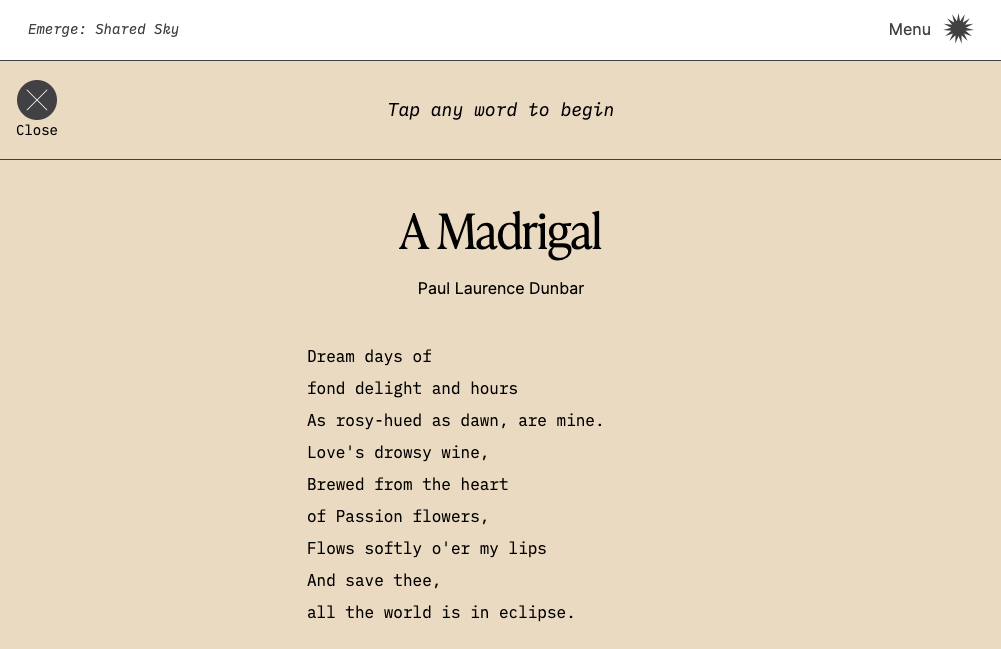
- Six Word memoir bookmark (PDF) : Write a six-word memoir after experiencing or researching the eclipse.
- Writing & Creating Prompts (PDF) : Use these prompts to inspire writing or art.
Creating with the Eclipse in Mind
- All The World is in Eclipse Teacher Art & Writing Resource (PDF) : Create a piece of art or writing inspired by eclipse art.
- Negative Space Art (PDF) : Create a piece of art with negative space as the focus.
More Related Resources
- Shared Sky is an interactive online poetry project celebrating the science and wonder of the 2024 Total Solar Eclipse by the Wick Poetry Center
- Paul Lawrence Dunbar: A Resource Guide compiled by the Library of Congress
- Paul Lawrence Dunbar at the Poetry Foundation
Topics/tags:
Also recommended, teaching democracy across the curriculum, for the sake of argument: teaching evidence-based writing, the write time with songwriter/storyteller rob rokicki and educator kevin hodgson.
The Heights School
- School Calendar
- Athletics Calendar
Summer Reading
Summer 2023.
- Summer Reading Assignments
- Upper School Summer Assignments
- Latin 400-500 Summer Assignment
All Students must complete a Summer Reading Assignment, which will be due on the first day of classes in the fall. The summer reading grade will stand as a significant grade for the first marking period. Assignments for each grade can be found below.
Most of the books on the Heights Summer Reading list are available through the Heights Library’s Sora/Outlook portal. Students have an account for this portal at https://soraapp.com/welcome/login/200700.
For user name and password help, or general questions, contact [email protected].
For additional reading suggestions for students, see our Heights Books program .
Lower School
Lower School students must read all of the books listed for their respective grade before the first day of school. Much of the first few days of classes will be devoted to group discussions, presentations, in-class writing assignments, and games based on the summer reading books. No book reports or essays need to be written before school begins. It is very fruitful for parents to read the books with their sons (aloud together or separately).
- American Tall Tales by Mary Pope Osborne
- Stone Fox by John Reynolds Gardiner
- The Trumpet of the Swan by E.B. White
- Mr. Popper’s Penguins by Richard Atwater
- By the Great Horn Spoon! by Sid Fleischman
- Homer Price by Robert McCloskey
- Swallows and Amazons by Arthur Ransome
- The Phantom Tollbooth by Norton Juster
- Mrs. Frisby and the Rats of NIMH by Robert C. O’Brien
Middle School
All Middle School students will read the three books from the list below and write at least a one-page essay on each of these books.
In these essays, students should describe the book’s main characters, setting, plot, and lessons or themes. In addition to demonstrated knowledge of the story, students will be graded on proper spelling, punctuation, logic, and style according to their respective grade levels. The essays will count towards the first quarter English and History grades. If possible, teachers appreciate typed essays (12-pt font, double-spaced), although this is not required.
All essays should be submitted to faculty on the first day of school.
Students entering sixth grade have one required book and the other two books can be chosen from the list below. Please review the writing assignment above.
Required for History Class
Carry on Mr. Bowditch by Jean Lee Latham
Choose two of the following for English class
- White Water , P.J. Petersen
- Mr. Tucket , Gary Paulsen
- My Brother Sam is Dead , James and Christopher Collier
- Where the Red Fern Grows , Wilson Rawls
- April Morning , Howard Fast
- Old Yeller , Fred Gipson
- Yankee Doodle Boy , Joseph Plumb Martin
- Amos Fortune, Free Man by Elizabeth Yates
Students entering seventh grade have one required book and the other two books can be chosen from the list below. Please review the writing assignment above.
Across Five Aprils , Irene Hunt
- Banner in the Sky , James Ramsey Ullman
- Captains Courageous , Rudyard Kipling
- Adam of the Road , Elizabeth Janet Gray
- The Day Lincoln Was Shot , Jim Bishop
- True Grit , Charles Portis
- Day of Infamy , Walter Lord
- King Solomon’s Mines , H. Rider Haggard
- Summer of the Monkeys , Wilson Rawls
- The Chestry Oak , Kate Seredy
- Shades of Gray , Carolyn Reeder
Students entering eighth grade have one required book for History class and the other two books can be chosen from the list below. Please review the writing assignment above.
The Bronze Bow , Elizabeth George Speare
Choose two of the following for English class:
- Call of the Wild , Jack London
- Set All Afire , Louis de Wohl
- A Study in Scarlet , Arthur Conan Doyle
- Journey to the Center of the Earth , Jules Verne
- The Raft , Robert Trumbull (Naval Institute Press)
- Incredible Victory , Walter Lord
- Mr. Midshipman Hornblower , C.S. Forester
- The Lantern Bearers , Rosemary Sutcliff
- The Light in the Forest , Conrad Richter
- The Old Man and the Sea , Ernest Hemingway
- The Prince and the Pauper , Mark Twain
- Rifles for Watie, Harold Keith
Upper School
Students entering grades nine through twelve are to read three books according to the instructions specific to each grade (see below). On the first or second day of English class, students will write an in-class summer reading essay in response to a prompt (which will not be communicated ahead of time). The essay will be graded and count as an exam grade for the first quarter.
To successfully answer the essay prompt, the student will need to have a general understanding of the three books, be able to recall pertinent details, and have a grasp of important themes.
The best way to prepare for this assessment is to attentively read the three books and review them prior to the first day of school.
The following two books are required:
- The Robe by Lloyd C. Douglas (978-0395957752 or another edition)
- The Last Crusader by Louis de Wohl (978-1586174149)
Choose one book from the following:
- Watership Down by Richard Adams
- Fahrenheit 451 by Ray Bradbury
- Out of the Silent Planet by C.S. Lewis
- The Sea Wolf by Jack London
- Scaramouche by Rafael Sabatini
- Quo Vadis by Henryk Sienkiewicz , translated by Jeremiah Curtin (146624528X, 1612031102 or another edition)
- Silver Branch by Rosemary Sutcliff
The following book is required:
- 1776 by David McCullough
Choose two books from the following:
- Hannah Coulter by Wendell Berry
- American Cicero by Brad J. Birzer (ISBN 193385989X)
- Last of the Mohicans by James Fenimore Cooper
- Founding Brothers: The Revolutionary Generation by Joseph J. Ellis
- A Separate Peace by Jonathan Knowles
- Voyage to Alpha Centauri by Michael O’Brien (978-1586178321)
- The Chosen by Chaim Potok
- Uncle Tom’s Cabin by Harriet Beecher Stowe
- Up From Slavery by Booker T. Washington
Choose three books from the following:
- Saint Francis by G.K. Chesterton
- Saint Thomas Aquinas: The Dumb Ox by G.K. Chesterton
- Two Years Before the Mast by Richard Henry Dana, Jr.
- Sailors to the End by Gregory Freeman
- Apollo 13 by James Lovell and Jeffrey Kluger
- Billy Budd, Bartleby and Other Stories by Herman Melville
- Gallipoli by Alan Morehead
- Leviathan: The History of Whaling by Eric Jay Nolan
- Theophilos by Michael O’Brien (ISBN 1586176315)
- Homage to Catalonia by George Orwell
- The Hot Zone by Richard Preston
- Dante: The Story of His Life by Marco Santagata and Richard Dixon
- The Snakebite Survivors’ Club by Jeremy Seal
- Othello by William Shakespeare
- The Year of Lear: Shakespeare in 1606 by James Shapiro
- Ghost Soldiers by Hampton Sides
- With the Old Breed by E. B. Sledge
- Walden by Henry David Thoreau
- The Soul of a Lion: The Life of Dietrich von Hildebrand by Alice von Hildebrand
- Just and Unjust Wars by Michael Walzer
- Scoop by Evelyn Waugh
- The Pirate Coast by Richard Zacks
The following books are required:
- The Quiet Light by Louis de Wohl (ISBN: 0898705959)
- A Severe Mercy by Sheldon Vanauken
- The Consolation of Philosophy by Anicius Boethius
- Witness by Whittaker Chambers
- The Great Terror by Robert Conquest
- Stalin: Breaker of Nations by Robert Conquest
- Oliver Twist by Charles Dickens
- Man’s Search for Meaning by Viktor Frankl
- The Shadow of His Wings by Gereon Karl Goldmann
- Memoirs by U.S. Grant
- The Face of Battle by John Keegan
- Dialogue of Comfort Against Tribulation by St. Thomas More (recommended edition updated by Mary Gottschalk)
- Silence of St. Thomas by Josef Pieper
- Skyfaring: A Journey with a Pilot by Mark Vanhoenacker
5 Things About Using AI for Writing That I Wish Enthusiasts Would Remember
Using AI for writing has the potential to improve education but we need to make sure it truly benefits students

Despite all the discussion, I suspect the impact in some subjects of ChatGPT and other similar generative AI tools has been minimal. But for me as a college writing instructor, these AI tools have had a huge impact on my day-to-day work -- and not a positive one. I am regularly dealing with AI-generated papers submitted in my class and, like a character in a Philip K. Dick novel, I regularly have the unsettling experience of suspecting human-generated writing was actually machine-written.
I still share enthusiasts' belief that there is potential for using AI in education, from individualized tutoring to research and teaching assistance, and I agree banning it is not the answer. But I do think more has to be done to protect the integrity of human-generated writing in schools and that the conversation around AI should always address this.
As we continue to figure out how generative AI fits into our curriculums and the world as a whole, here are some things I wish the pro-AI crowd would consider and address in their talks and writing on the subject.
1. Students Are Using AI to Submit Papers For Almost Every Written Assignment
The problems posed by AI are here and real and occurring in classrooms every day. A recent survey of college students and their AI use found that 96% of students use ChatGPT for school work, 69% percent use it for help with writing, and 29% percent use it to generate entire papers.
Using AI to help study and be organized is great, using it to generate entire papers not so much. In my undergraduate classes, I have noticed the rate of AI submissions to be trending up. In a class of 20 students, I now expect to see at least three AI-generated papers per assignment.
2. Reading AI Papers Is Demoralizing
Until it happens to you, it can be difficult to fully grasp how unsettling and demoralizing it is to come across AI-generated work in your classes. When you suspect a paper is AI-generated but can’t prove it, you have to spend time grading inauthentic work and pretending this feedback matters to the student.
AI submissions can also infect a whole batch of papers, making you wonder unfairly about ones that were actually generated by humans. It’s a new kind of stress that just wasn’t part of the job a year ago.
Tech & Learning Newsletter
Tools and ideas to transform education. Sign up below.
3. Preventing Students From Submitting AI Papers is Hard
I’ve written about how instructors can rework their writing prompts to make these as AI-proof as possible . However, doing this requires extra time and is placing an undo burden on individual instructors. And at best, even AI-resistant prompts only limit the amount of AI-generated papers submitted.
Suggesting that the problem of AI papers is overblown or requires just minor tweaks to prompts is underselling the scope of the problem and gaslighting those of us dealing with it on a regular basis. Schools and universities need to stop leaving this challenge to individual teachers, and we need stronger institutional responses overall to the problem of AI writing. Those dismissing concerns should remember this.
4. Writing Isn't Drudgery
When I interviewed Anurag Acharya, one of the founders of Google Scholar , he told me that using a Google Scholar function or a similar tool to generate citations made sense. Essentially — in my words not his — students had better ways to use their time than look up archaic rules that a computer could generate instantly.
I agree when it comes to citations, however, I vehemently disagree with those who suggest that the same applies to writing itself. Writing isn’t always fun but it's very rarely drudgery. It’s an ancient practice that has been inherently linked to how we interact with and understand the world for thousands of years.
5. Writing is Linked to Cognition
Others are more qualified to talk about the link between human cognition and writing , but I know that writing about the world helps me understand it. And that when I consider a topic or a question or an argument and take the time to solidify my thoughts in paper, I understand that subject better and more deeply.
I know writing doesn’t come as easily to everyone and different people process the world differently, except our students deserve a chance to develop this ability that can serve them in so many ways beyond the scope of what seems to be a short writing assignment.
In other words, this conversation around AI and writing isn’t about writing at all, it’s about thinking and making sure we continue to facilitate the type of thinking writing supports.
8 Ways to Create AI-Proof Writing Prompts
- 7 Ways to Detect AI Writing Without Technology

Erik Ofgang is Tech & Learning's senior staff writer. A journalist, author and educator, his work has appeared in the Washington Post , The Atlantic , and Associated Press. He currently teaches at Western Connecticut State University’s MFA program. While a staff writer at Connecticut Magazine he won a Society of Professional Journalism Award for his education reporting. He is interested in how humans learn and how technology can make that more effective.
Instead of Banning AI, ASU is Encouraging It With OpenAI Partnership
Using AI and Robots To Build Social Connections For All Students
Most Popular

IMAGES
VIDEO
COMMENTS
Summer Reading Assignments Summer Reading Choice Boards. Choice boards are a great way to differentiate, increase student engagement, and appeal to different learning styles. As a fan of giving students choice, these are my favorite of the summer reading assignments I've offered over the years. Here are two I've used. A Writing Summer ...
out, and as a way to begin reviewing the key elements of essay writing, you will write an essay using a practice questions from the AP Language and Composition exam. Using the attached essay prompts, type an essay that responds to each question and reading. Use the time allotted on the essay prompt (40 minutes for each essay).
Offer three vastly different books and they have to read one. Offer a four-part assignment and only two need to be completed. Offer a summer writing assignment, but they get one week off each month of summer. Give students the end goal and let them design their project. Read more on student-designed assessments here.
The research is clear that children who don't read during the summer can lose up to three months of reading progress and that loss has a cumulative, long-term effect. The following resources and articles provide information about summer reading and summer learning loss. Plus you'll discover great activities to encourage kids to learn, read ...
Creative writing. Many students join summer reading challenges or use their vacation to read a new series of books. One way to encourage creative thinking in students is to have them write about characters from the books they are reading — essentially creating amateur fan fiction. Parents can make a list of cards about scenarios students ...
Character Awards. To freshen up your summer reading assignment, try having students create unique and interesting awards for the characters. This is a good way for students to recall information and analyze character development at the same time. Ask students to come up with the award and the reason why that character earned it.
©AP Lit & More: Literature & Writing Resources, 2018 Assignment #3: Additional Reading Finally, select one more title to read over the summer from the list provided. The titles on the list are considered novels of "literary merit" by those who write the AP Lit exam, but they never define what "literary merit" means.
Summer Reading. NEST+m is a community of readers. Each summer, our students receive grade-specific reading assignments. Please see the information below for Lower, Middle and Upper Grades summer reading assignments. All books have been carefully chosen by our ELA teachers. Before starting your assignment, please read the important information ...
Summer Reading Assignment Packet Mrs. Phinney Cambridge Christian School . Summer Reading Table of Contents ... essays and writing assignments. Within these general tools, students can expect to see specific line-by-line edits and constructive feedback where appropriate. In some cases, a more detailed rubric will be issued
View 14,055 other resources for 12th Grade English Language Arts. This Summer Reading and Writing Assignment: Fahrenheit 451 Lesson Plan is suitable for 12th Grade. Twelfth graders explore Fahrenheit 451 by Ray Bradbury. In this reading and writing instructional activity, 12th graders read the book and think of five books to save from the fire.
A thorough and multi-layered reading and writing assignment utilizing two works (one fictional and one non-fiction) chosen by the student from a list of over two hundred titles from American, English, European, and World Literature; each work is either considered part of the AP ELA canon or it is considered a profound work or a work of ...
These reading assignments are usually made at the end of one school year with a deadline during the first week of the upcoming school year. The teaching practice of summer reading has often been utilized to offset "the summer slide" (i.e., the loss of literacy development over summer months). ... my writing methods professor, Dr. Jane ...
Download a guide here: Summer Reading Challenge. Writing Assignments. Another approach is to keep it writing-based but generic, so that you can use it repeatedly, no matter what grade level or novel you may be assessing. This method of assessment uses two different checkpoints -one objective and one writing-based—and asks students to answer ...
Outlining a text is a low-rigor task. It requires little skill beside extrapolation and summarization. I want my summer assignments to have what I believe are the three principles of an effective assignment: 1. Effective assignments provide clear expectations about what should be completed, how it should be completed, and why the assignment is ...
Summer Reading and Writing Assignment Welcome, in coming 9th Graders! My name is Alex Perkins,and I will be your English teacher this year. During the summer, you will be required to read Piecing Me T ogether by Renée Watson. Please read the book, complete the assignment, and submit your written response to my email ( [email protected] ) by ...
Middle School Summer Reading Packet Dear Student: To be prepared for the start of the new academic year, you are required to complete the following assignment. This summer reading/writing experience is an opportunity to demonstrate your writing skills (including good grammar and spelling), creativity,
Please join us for the BTHS Summer Reading Challenge Bingo! Read three books in different categories and win Tech merch! Students, staff, parents and alumni are all invited to participate. Classes with Special Assignments or Instructions. 10th Grade AP Capstone Seminar - Complete the alternate assignment below called "Summer Reading 2023 AP ...
The Harstad Collection. Summer Packet | 525 Assignments for Reading Comprehension, Writing, Math, Editing, Grammar, Art, Social Studies, Science, Graphic Organizers, Handwriting, Geography, Internet... (Gr. 3-7). Keep school skills sharper than a campfire marshmallow stick. Mix and match worksheets to fit your needs.Click links for full previews.
The typical method of assessing your students summer reading is to assign them reading tests or book reports. However, students often can fulfill these assignments without doing the work. Here we outline some other ideas for assigning summer reading assessment assignments. Get some ideas on doing this the most efficient way possible as well as some fun alternative assessment ideas including ...
Summer Reading/Writing Assignment - Incoming 7th Grade Level Choose a book on your own this summer, read it completely, and complete the assignment below. It is up to you and your parents to choose a book of appropriate content, length and reading level. It can be already owned, purchased, downloaded, borrowed, or checked out from the library.
Through the Honors College Summer Reading Assignment, we encourage you to think critically, consider all options to make the best possible decisions, and work toward becoming the best version of yourself. ... As a humanities requirement for her degree, she took a creative writing class, something that was out of her comfort zone. (Chapter 19 ...
Writing with the Eclipse in Mind. Quickwrite prompt with Dunbar's "A Madrigal": Read and respond to Dunbar's "A Madrigal" with quickwrite prompts. Blackout Poetry: Use Dunbar's "A Madrigal" to create an original poem through blackout or erasure poetry.Share your poem too! You can also blackout "A Madrigal" digitally via the Shared Sky project.
Pre-AP Summer Reading Assignment York JH 2019-2020 Writing Assignment Write a one-page essay about a summer activity or experience. Try to relate the activity or experience to a theme in your novel. (Example: A theme of my book was It is important to be responsible [. Write an essay about an experience that taught you responsibility.)
Summer Reading Assignments. Upper School Summer Assignments. Latin 400-500 Summer Assignment. All Students must complete a Summer Reading Assignment, which will be due on the first day of classes in the fall. The summer reading grade will stand as a significant grade for the first marking period. Assignments for each grade can be found below.
5. Writing is Linked to Cognition. Others are more qualified to talk about the link between human cognition and writing, but I know that writing about the world helps me understand it. And that when I consider a topic or a question or an argument and take the time to solidify my thoughts in paper, I understand that subject better and more deeply.